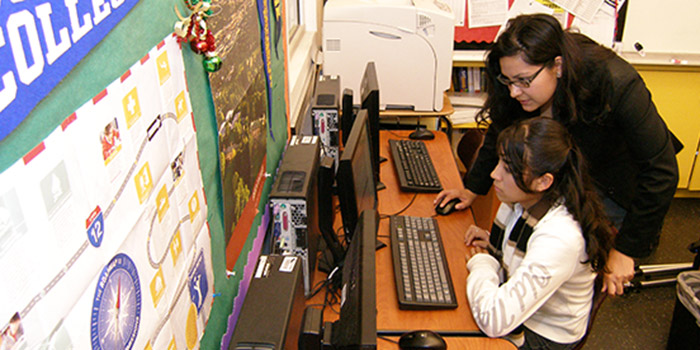The Latino Ed. Roundup: Teachers Take to the Streets
Last week was Teacher Appreciation Week, but educators around the country haven’t been feeling much love lately. Thanks to decades of public-school budget cuts, static wages, and disrespect, many of them are stressed out, a recent survey finds, and they’ve hit a tipping point. Teachers took to the streets in West Virginia in February. Since then, teachers in Oklahoma, Kentucky, Colorado and Arizona have walked out, too, a Vox article reports. North Carolina is next.

The U.S. is one of the wealthiest countries in the world, but educators in some states live hand to mouth, work multiple jobs and/or rely on public-assistance programs, a CNN article notes. Teachers routinely take money out of their own pockets to buy school supplies for their students, an Education Week article says.
Why? Because, for the past decade, legislators in those mostly red states have opted to give tax breaks to the rich and big business instead of investing in public schools and teachers, Paul Waldman, a columnist for the Washington Post’s Plum Line blog, explains.
It’s no accident that the move away from using tax dollars to fund public education comes as the American population is becoming more racially diverse than ever, articles in The Atlantic and The New York Times suggest. Nikole Hannah-Jones, an investigative journalist and author of the aforementioned Times article, says white parents have been withdrawing from public schools or moving away from school districts with large numbers of black and brown children since courts started mandating desegregation.
Gender bias is also a major factor, Huffington Post reporter Rebecca Klein suggests. Teaching is a predominantly female profession and, as such, wages are abysmal.
Dawn Penich-Thacker, a spokeswoman for Save Our Schools Arizona, an education advocacy group that was involved with the protests, told Klein that it’s not a coincidence that this is happening in a field that’s primarily female and “that is seen as serving children,” which is considered “women’s work.”

The average pay for a public-school teacher nationwide is around $58,000 a year, according to data from the National Education Association. That sounds good until one considers that teacher pay varies greatly and that teachers actually make 17% less on average than other workers with advanced degrees and similar training, an article on The 74 notes.
Before the strike in West Virginia, new teachers there took home about $31,000, with a median salary of only $45,000; teachers in Oklahoma got even less, USA Today reports.
In fact, Vox estimates that teachers in West Virginia have seen their pay slashed by 11 percent since 2009, while teachers nationwide have taken an average pay cut of 3 percent after adjusting for inflation. Teacher pay is so low (and shortages are so bad) in some districts that they’re importing instructors from the Philippines, a recent New York Times story reported.
Yet despite the crummy pay, the long hours teachers spend prepping and grading, the huge class sizes, the subpar conditions at many public schools, and the enormous mental toll of having to be part miracle worker, mentor, parent, psychologist, and security guard for a salary that’s only slightly above minimum wage in many places, most teachers say they wouldn’t give up their calling for anything. They just want a living wage, decent benefits, and enough funding to adequately meet their students’ needs. Is that so much to ask?
The good news is that most Americans would gladly chip in more to give teachers a pay raise, a recent PBS poll found. That’s probably why the strikes have so far borne fruit: in Oklahoma, for example, legislators agreed to tweak the state’s tax framework in order to boost education funding and teacher salaries, an article in New York Magazine observes. (This in a state where Republican legislators long denied teachers a raise and forced schools to go to a four-day week, but pushed consistent tax cuts for big business and the well-off as a supposed cure for the state’s 1.5-billion budget hole, a Vox article notes.)
The bad news is conservative lawmakers are still making the working and middle classes foot the bill, another Vox article notes. Unfortunately, some red states couldn’t raise taxes on corporations and the wealthy, even if they wanted to: In Republican states that have a “supermajority” tax rule—meaning 60% or more of a state’s legislators must back a tax increase for it to pass (as opposed to the usual 51%)—getting a tax hike enacted is next to impossible, according to an article on Quartz.
That doesn’t bode well for the future of the country, as our collective failure to fund schools, support teachers, and promote the greater public good will only exacerbate inequality and stunt economic growth. Research shows that investing in education is far better for state and federal economies than tax cuts.
What’s more, it’s essential for democracy, which only works “if those who have the money or the power to opt out of public things choose instead to opt in for the common good,” writes Hannah-Jones, of the Times. “It’s called a social contract, and we’ve seen what happens in cities where the social contract is broken: White residents vote against tax hikes to fund schools where they don’t send their children, parks go untended and libraries shutter because affluent people feel no obligation to help pay for things they don’t need.”
Is that really the kind of country in which we want to live?
Compiled and written by Gabriela Montell, Communications Manager, UnidosUS



